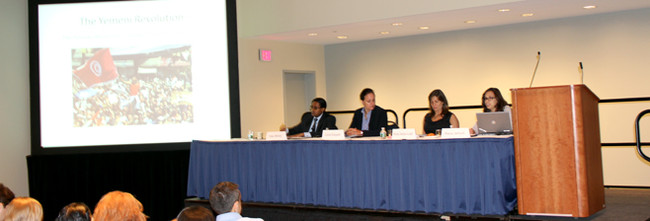
By: Erin Cox
As popular movements across the Middle East and North Africa open doors for new voices to join the political process, women have an unprecedented chance to redefine their roles in government and society. IFES Senior Research Specialist Rola Abdul-Latif and Deputy Director for Europe and Asia Vasu Mohan shed light on some of the challenges and opportunities facing women in the region during InterAction’s Forum 2011 on Aug. 12 in Washington.
Mohan opened the panel discussion by saying the ongoing changes in the region offer a chance for international organizations to evaluate their activities and perspective on gender equality. He emphasized that equality is not only a women’s issue and that protecting human dignity and fundamental rights “begins with us.”
Abdul-Latif shared findings from the Status of Women in the Middle East and North Africa (SWMENA) project, highlighting striking opinion data collected on women’s political and civil participation and legal rights in Lebanon, Morocco and Yemen. Although a majority of women polled in all three countries said they would support women as political candidates, Abdul-Latif said, large percentages of those same women believe men make better political leaders. This belief was shared by 46 percent of women in Lebanon, 35 percent in Morocco and 85 percent in Yemen.
Mohan and Abdul-Latif were joined on the panel by Yemeni gender specialist Rana Jarhum and Carla Koppell, senior coordinator of the United States Agency for International Development’s Office of Gender Equality and Women’s Empowerment.
Jarhum outlined the three top priorities for women in Yemeni society: participation in political dialogue; a minimum representation of 30 percent in political bodies; and equality in all aspects of life that is guaranteed by the constitution. She said the most important challenge facing Yemeni women in the coming months will be to take full advantage of the window of opportunity for reform brought about by the struggle for political change. If the “heroic role” of women is not recognized now, she said, all efforts at further reform may be threatened.
Koppell stressed the importance of women gaining political power and representation internationally, reminding the audience that democracy is incomplete without equal participation from men and women and highlighting the perspectives women can bring to power. Women political leaders invest resources differently, assert a different set of priorities in government and tend to promote nonviolence in conflict resolution. To continue enhancing their political roles and avoid the kind of retrenchment that already has taken place in Egypt, women must continue to challenge the views that many in the Middle East consider cultural norms, she said.
All four panelists agreed that formal guarantees of representation such as equal rights laws, gender quotas in government and constitutional protections are needed to secure women’s involvement in a successful democratic transition.
View Rola Abdul-Latif's presentation on the findings of IFES' SWMENA project surveys here.
View Rana Jarhum's presentation on the role of women in Yemen's changing political climate here.
For more information about IFES’ SWMENA project, click here.
- A Rape Case in Tunisia puts the Legal System on Trial
- Women: Another Casualty of Egypt’s Draft Constitution
- Call for Communication to the UN Commission on the Status of Women
- Resources
- SWMENA data used in research
- IFES Releases Data on the Status of Women in Egypt and Tunisia
- SWMENA Conducts Regional Lessons Learned
- SWMENA Featured in Interaction Monday Developments
- IFES Congratulates the 2011 Nobel Peace Prize Laureates
- Public Opinion Data and Political and Legal Reform Opportunities for Women in Yemen, Morocco and Leb
- New Challenges, Opportunities for Women’s Political Participation in the Middle East
- Women Count
- Infographics Help Advocacy Efforts for Women
- MENA Protests Could Help Advance Women’s Rights
- Popular Protests Pave Way for Women’s Rights in Yemen
- Observing International Women’s Day
- IFES Releases Paper on the Use of Gender Quotas in the Arab World
- Collaborating with Visionaries to Improve the Status of Women in Morocco
- Status of Women in the Middle East and North Africa
- Lobby Training Manuals for Activists
